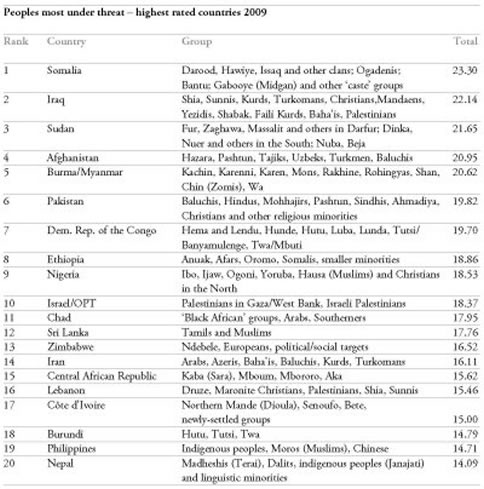Ilankai Tamil Sangam30th Year on the Web Association of Tamils of Sri Lanka in the USA |
|||
 Home Home Archives Archives |
Peoples Under Threat 2009by Minority Rights Group International, UK, October 2009
[Most human rights groups look at crimes against individuals & do not mention the group these individuals belong to. The Minority Rights Group is one that pays attention to crimes against the collective and efforts to eliminate entire groups. This is why it is important for Eelam Tamils. -- Ed. Comm.] Access a printable PDF of this briefing and the full Peoples Under Threat 2009 rankings table.
Every year Minority Rights Group International publishes Peoples Under Threat, identifying those groups or peoples around the world most at risk of genocide, mass killing or other systematic violent repression. 2009 is the fourth year that MRG has compiled the list, which is based on current indicators from authoritative sources (see How is Peoples Under Threat calculated?)... Violent extremism and identity conflicts In both his Ankara and Cairo speeches in 2009, US President Barack Obama emphasized that ‘America is not – and never will be – at war with Islam’. He went on to seek common cause with the Islamic world: ‘The enduring faith of over a billion people is so much bigger than the narrow hatred of a few. Islam is not part of the problem in combating violent extremism – it is an important part of promoting peace.’ But he also expressed his determination to continue using military means to confront extremism: ‘...despite the costs involved, America’s commitment will not weaken. Indeed, none of us should tolerate these extremists. They have killed in many countries. They have killed people of different faiths – but more than any other, they have killed Muslims.' However, the military response to violent extremism in recent years has resulted in a new generation of identity conflicts that have placed whole communities in peril. Since 2001, when after 9/11 the US pursued the Afghanistan Taleban and the al-Qaeda unit led by Osama bin Laden and Ayman al Zawahiri, the ‘violent extremists’ to which Obama referred have proliferated. They now operate in many countries in South Asia, the Middle East and North Africa, many under the al-Qaeda label. For the civilian populations in such countries – mainly but not exclusively Muslim – the risks do not end there. In those states most affected, including Afghanistan, Pakistan, Iraq and Somalia, the civilian population faces the combined threat of terrorist attacks by armed opposition groups, military operations by national armed forces or by the US or its allies and, most dangerous of all, the wider armed struggle for power that has developed based on sectarian or ethnic identities. It is this combination of factors, created and sustained by armed conflict, that makes the situation so deadly for both Muslim and non-Muslim minorities. Communities perceived to share an identity with violent extremists, such as the Pashtun in Pakistan and Afghanistan, or Sunni Arabs in Iraq, are caught between armed opposition groups and the military operations launched to defeat them. Members of smaller sects or non-Muslim minorities, such as Yezidis, Shabak or Chaldo-Assyrians in Iraq, or Sikhs and Hindus in Pakistan, are targeted by Islamic extremists because their beliefs are considered to be un-Islamic. Historically poor or marginalized minorities with no militias to defend them, including the Bantu and Gaboye in Somalia, are particularly vulnerable where there is generalized insecurity. A state of war has also enabled governments to undertake the violent repression of other minorities, such as Baluchis in Pakistan. Once such identity conflicts have taken hold, the cycles of community mobilization and revenge killings make them difficult to dislodge, and conflict resolution and reconciliation become messy and lengthy processes. As President Obama himself remarked in his Cairo speech, ‘It is easier to start wars than to end them’. |
||
|
|||
